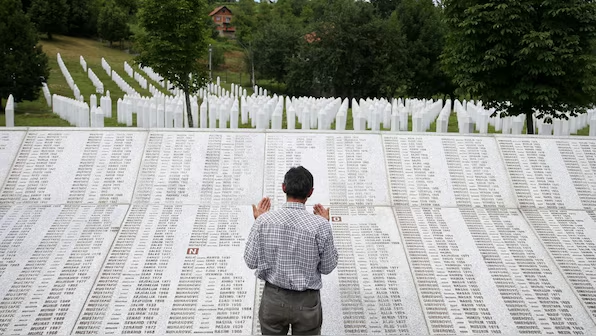UN adopts annual day to commemorate the 1995 atrocity in Srebrenica that killed over 8,000 Bosnian Muslims
UN adopts annual day to commemorate the 1995 atrocity in Srebrenica that killed over 8,000 Bosnian Muslims.
The UN on Thursday endorsed a resolution commemorating the killing of over 8,000 Bosnian Muslims in 1995 by Bosnian Serbs. Serbs are adamantly opposed to this resolution because they think it will portray them all as “genocidal” supporters of the mass killing.
A total of 68 nations chose not to participate in the ballot, leading to an 84-19 vote among the 193 members of the General Assembly. This suggests that a lot of nations were worried about the decision’s potential impact on efforts to promote reconciliation in Bosnia, which was severely split.

The resolution designates July 11 as the “International Day of Reflection and Commemoration of the 1995 Genocide in Srebrenica,” and it will be observed on that day every year starting in two months.
Milorad Dodik, the president of Bosnian Serbs, and Aleksandar Vucic, the populist president of neighboring Serbia, actively campaigned for a “no” vote even though the resolution—sponsored by Germany and Rwanda—did not specifically name Serbia as the offending country.
Bosnian Serbs seized control of a UN-guarded safe haven in Srebrenica on July 11, 1995. After being divided from their mothers, sisters, and spouses, at least 8,000 Muslim Bosniak men and boys were killed. Anyone who tried to escape was tracked down outside the town and across the mountains.
The tragic Srebrenica killings were the result of Bosnia’s 1992–1995 war. Yugoslavia’s dissolution sparked nationalist fervor and territorial ambitions that put Bosnian Serbs against the country’s two other major ethnic groups, setting the stage for the war.
Both Serbia and Bosnian Serbs have denied the existence of genocide in Srebrenica, despite the fact that two U.N. courts have established this.
Dodik, the president of Republika Srpska, the Serb-majority region of Bosnia, said on social media on Wednesday that the U.N. resolution—which is being imposed on it by proponents of the Muslim Bosniaks—will split the nation. If the resolution was approved, he suggested that his administration would withdraw from Bosnia.
Dodik has already made repeated threats to force the Serb-ruled regions to secede from Bosnia and join neighboring Serbia. British and American sanctions are imposed on him and a few other Bosnian Serb officials in part because they put a U.S. peace plan that put an end to the Bosnian war in jeopardy.
The final version of the resolution reaffirmed the General Assembly’s “unwavering commitment to maintaining stability and fostering unity in diversity in Bosnia and Herzegovina.”
The 2007 International Court of Justice ruling—the highest court in the United Nations—that the crimes committed in Srebrenica amounted to genocide is included in the draft resolution. It was the first genocide to occur in Europe since the estimated 6 million Jews and members of other minorities perished during the Nazi Holocaust during World War II.
April 7 is the date on which the Hutu-led government began executing members of the Tutsi minority and their supporters. The official UN remembrance of the Rwandan genocide in 1994 is being held today, as stated by Germany’s U.N. Ambassador Antje Leendertse, who made this announcement last week.
The draft resolution aims “to close the gap” by designating a specific U.N. day “to commemorate the victims of Srebrenica,” she continued.
July 11 is designated as the official day of remembrance for the Srebrenica tragedy. The son of Holocaust survivors, Menachem Rosensaft, an adjunct professor at Cornell Law School, stated to The Associated Press on Wednesday that this “is a moral and legal imperative.”
Srebrenica was meant to be a safe place, but Dutch U.N. peacekeepers abandoned it, leaving the Bosniaks who sought shelter there “to be murdered on the U.N.’s watch,” according to Rosensaft. The Muslim Bosniaks who died there deserve to have their deaths and the way in which they died remembered.










